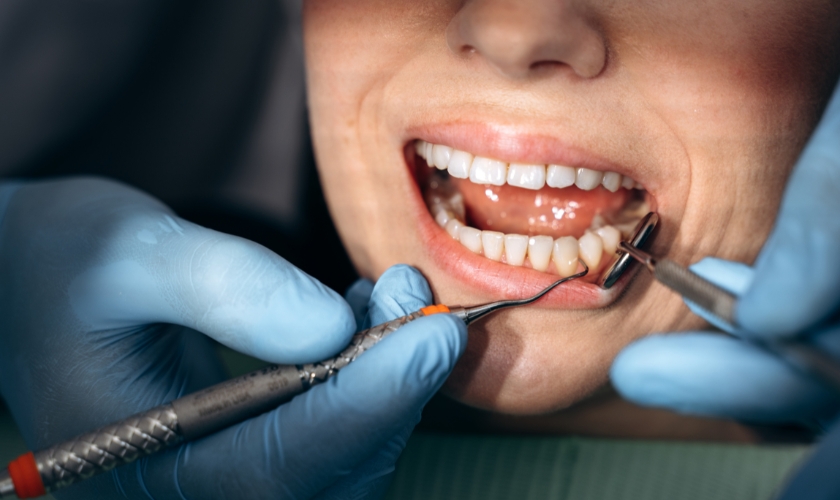The Top 5 Habits for Maintaining Good Dental Hygiene at Home

Taking care of your teeth isn’t just about having a bright smile; it’s about protecting your overall health. Poor dental hygiene can lead to cavities, gum disease, and even impact your confidence.
The good news?
Maintaining great oral health starts right at home. With a few simple habits, you can keep your teeth strong, your gums healthy, and your smile shining.
So, what does it take to maintain good dental hygiene at home? It’s more than just brushing twice a day. A complete dental care routine involves a mix of daily habits, smart choices, and consistency.
In this blog, we’ll break down the five essential habits that help you achieve and maintain excellent oral health. Whether you’re looking for tips to improve your routine or want to ensure your family stays on track, you’re in the right place. Let’s explore the simple yet effective steps that make a big difference in your dental hygiene journey.
Ready to level up your at-home care? Let’s get started!
Habit #1: Brushing Your Teeth the Right Way
Proper brushing is the foundation of good dental hygiene. It removes food particles, plaque, and bacteria that cause tooth decay and gum disease. However, brushing the wrong way may not offer the protection your teeth need.
- Use a soft-bristled toothbrush to prevent gum irritation and enamel erosion.
- Brush twice daily for two minutes each time, focusing on all tooth surfaces.
- Opt for fluoride toothpaste to strengthen enamel and fight cavities.
- Replace your toothbrush every three months or sooner if the bristles fray.
Mastering proper brushing techniques can make a significant difference in maintaining clean, healthy teeth and gums. If you’re unsure about your brushing routine, consider a dental cleaning in Loomis, for expert advice and thorough care.
Habit #2: Flossing Daily for Complete Cleanliness
While brushing is vital, it only cleans about 60% of your tooth surface. Flossing daily removes plaque and food debris from between your teeth and along the gumline—areas your toothbrush can’t reach.
- Gently slide the floss between teeth and curve it around each tooth to clean effectively.
- Avoid snapping the floss, as this can damage your gums.
- For those who struggle with traditional floss, try floss picks, water flossers, or interdental brushes.
Regular flossing helps prevent cavities, gum disease, and bad breath. Combining brushing and flossing ensures your dental hygiene routine is complete and effective.
Habit #3: Using Mouthwash to Boost Oral Health
Mouthwash is a powerful addition to your daily routine. It reaches areas brushing and flossing may miss, helping to reduce plaque, prevent cavities, and freshen your breath.
- Choose an antiseptic mouthwash to kill bacteria and fight plaque buildup.
- Opt for fluoride mouthwash if you want to strengthen enamel and prevent cavities.
- Use mouthwash after brushing and flossing. Swish it for 30 seconds, but avoid rinsing with water afterward.
Adding mouthwash to your routine ensures a cleaner, healthier mouth. If you’re searching for thorough oral care, consider scheduling a dental exam near you to identify any hidden issues early.
Habit #4: Watching Your Diet for Better Oral Health
What you eat directly affects your dental health. Sugary and acidic foods feed harmful bacteria, leading to tooth decay, enamel erosion, and gum problems. On the other hand, nutrient-rich foods strengthen teeth and gums.
- Limit sodas, candies, and acidic snacks to protect your enamel.
- Eat foods that promote oral health, like leafy greens, dairy products, nuts, and crunchy fruits and vegetables.
- Stay hydrated with water to rinse away food particles and maintain saliva production.
- Avoid frequent snacking to reduce plaque buildup.
A tooth-friendly diet can significantly improve your dental hygiene while preventing long-term issues like cavities and gum disease.
Habit #5: Staying Consistent with At-Home Dental Care
Consistency is key to maintaining strong teeth and gums. A daily routine prevents oral health problems, saving you time, money, and discomfort in the long run.
- Set reminders to brush and floss twice daily.
- Use charts or rewards to keep kids motivated and excited about oral care.
- Keep your dental tools visible and easily accessible to build consistent habits.
- Schedule regular check-ups with your dentist to track progress and catch issues early.
Building strong dental hygiene habits at home doesn’t have to be complicated. With small, consistent efforts, you can protect your smile and prevent costly dental issues. Make brushing, flossing, and healthy choices part of your daily routine to enjoy long-lasting oral health. Remember, your smile reflects your care! If you ever need professional support, regular check-ups can keep your dental health on track. Take charge of your smile today—healthy habits make all the difference!




